Machines powered by self-learning algorithms and internet connections are displacing humans from all kinds of jobs, from driving to legal discovery to acting in movies. Will there be any work left for us to do? Economics says yes. Will it be awful or will it be nice? That is up to us.
Firstly, basic economic principles and the history of technological revolutions show that displacement does not mean replacement. Humans are not going to run out of economically valuable things to do for each other. We will not share the fate of horses in the early 20th century.
History shows that human labour not only survives technological revolutions but even becomes better paid. Economic principles explain why: technologies like automation increase productivity - the amount of economic value a society can produce with the same inputs of labour and raw materials. That means we can have all the things we used to have, plus we now also have some spare labour left over. We can use that spare labour to produce things lower down on our collective list of priorities, such as mass higher education and healthcare and interior decorating and pet grooming. The reason we didn’t make those things already (or not much of them) is that they were not important enough to be worth giving up anything higher on the list.
___
"...deep down many of us already suspect that what we do for a living is pointless, or even makes the world worse.."
___
So whatever jobs the robots can do better than us, economics says there will always be other - more trivial - things that humans can be paid to do. Like running a cat cafe.
But economics cannot answer the value question: Will that work be worth doing?
The problem is that economic prices (what we can get for something) are a poor guide to real value. Prices don’t reflect needs, but rather the distribution of purchasing power and the often bizarre institutions our society has accreted. Hence the existence of jobs like Walmart greeter, telemarketer, immigrant detention centre guard, copyright lawyer, and the armies of administrators pushing paper around America’s dysfunctional health insurance system. As the anthropologist David Graeber analysed in a memorable rant against Bullshit Jobs, deep down many of us already suspect that what we do for a living is pointless, or even makes the world worse.
Not all modern jobs are bullshit, of course. Lots of people get to create beautiful things, or help others, or contribute to humanity’s self-understanding. I am one of those lucky ones. I get paid to solve intellectual puzzles and teach students how to think better. As our society gets even richer, thanks to the robots, we can afford more jobs like that. But whether we spend our automation dividend that way depends on the choices we make, not economic principles.
How should a society make that choice? Should philosophers like me come up with a list of what’s worth doing or not? No one listens to the edicts of self-appointed philosopher kings – nor should they. Should we organise a big confab and try to all agree on what our society is for, and hence what counts as a valuable social contribution? It seems unlikely that such a conversation would get very far without turning oppressive: why should society get to decide what makes my life meaningful? Although perhaps we could all agree on some things - like the superiority of a world without telemarketers.
















Join the conversation